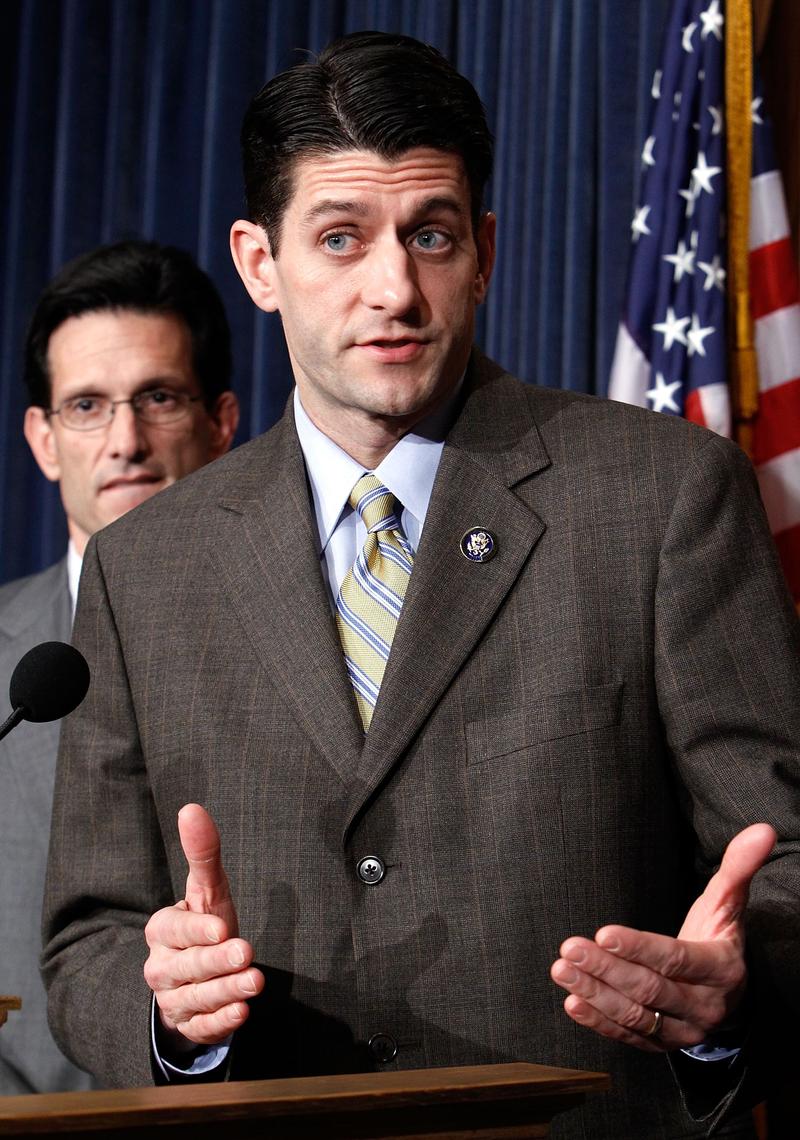
Welcome to Politics Bites, where every afternoon at It's A Free Country, we bring you the unmissable quotes from the morning's political conversations on WNYC. Today on The Brian Lehrer Show, Ezra Klein, columnist at The Washington Post and Newsweek, talked about the national budget debate and health care reform.
In January, a newly minted GOP-controlled House of Representatives passed a bill repealing the Affordable Care Act less than a year after it was signed into law. That covers the first half of their "repeal and replace" agenda, which was a campaign promise to get rid of Obamacare and put a Republican plan in place. In other words, that was the easy part.
Because now, Republicans (and their presidential hopefuls) must face the task of figuring out just what kind of health care law they'd like to see. And unfortunately, the only one on the table so far—Representative Paul Ryan's (R-WI) "Roadmap for America's Future"—makes the GOP very nervous. Ezra Klein explains:
It's a very expansive concept for how we should treat entitlements, taxes, every major element of fiscal policy going forward. It doesn't do much for the uninsured and for the main health care system, aside from changing the tax code a bit. It makes Medicare into a system of private insurance, where people sign up and purchase a private Medicare policy, and the way it controls costs is, it limits amount of the check you get to buy insurance...If insurance costs you $15,000, the government might only send you a check for $10,000 and leave you to cover the difference.
Essentially, Ryan is proposing to privatize Medicare and put a cap on the amount of government assistance people will get when purchasing their policies. Klein said that's absolutely the last thing that Americans want to hear, and Republicans know it.
[Ryan's] a guy who can talk about this stuff effectively and did the hard work, but his plan is much too radical; it's just a terrifying thing for most Americans. An NBC poll listed a bunch of things we could do with Medicare and taxes and other things to balance the budget. A very simplified and, frankly, friendly description of Ryan's plan, which didn't even get into the limited checks part, was the most unpopular thing we could possibly do—more unpopular than taxing the rich, more unpopular than anything else you could think of.
While rifts in the Republican party have started to open, President Obama has taken steps to corner his opponents in advance of the 2012 election. After all, Mitt Romney's support of an individual health care mandate while he was governor of Massachusetts gives the president a pretty big club to swing in debates. And regarding the rest of the candidates who take issue with mandates and other burdens on states, Klein said Obama recently tossed out a curveball.
Obama endorsed a proposal in which any state, if it wants to, can opt out of the Affordable Care Act—out of all of the provisions, all the mandates, everything—and still get all the money. The only thing they'd need to do is come forward with a plausible plan for covering as many people with as comprehensive insurance for as low of a cost. Republicans essentially freaked out, saying these are terrible conditions, insurance should be less comprehensive, we don't need to cover that many people.
Such a compromise may force Republicans to re-examine their "first principles" of health care. With the president chipping away at the most unpopular parts of the Affordable Care Act, the GOP promise of a better way will have to be better defined and sufficiently alternative. Ezra Klein said that the Right may come to the conclusion that they need to argue against the whole popular wisdom of what makes a health care system "good."
These are fights worth getting into. If the Republican party has decided that universal health care isn't a goal we should have in this country, fine. If they've decided they want a lower level of insurance to be the baseline, I think that's a legitimate argument...Until now, they haven't made that argument. They've said, we'll repeal Obamacare and replace it with all the popular stuff, none of the unpopular bits. I think what we're seeing now is that it's impossible.
Still, policy, much like repeal, is only half the battle. Republicans have done incredibly well controlling the message post-Obamacare. Much as they will need to outline a plan of their own, the president will have to outline a better defense of his.
There are essentially two controversial problems in health care: access, how many people are insureed and how easy it is to become insured; then there is cost, which we're all dealing with...What Obama and the Democrats have failed to persuade the American people of is that their bill delivers on cost...Republicans have been very effective at saying there will be a better way to do this that will be much easier on you, will control costs better—it's all complicated and people sort of would prefer the thing that doesn't sound like it could hurt them.